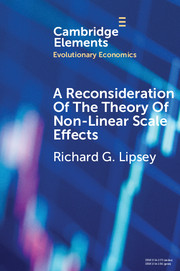Element contents
A Reconsideration of the Theory of Non-Linear Scale Effects
Published online by Cambridge University Press: 20 March 2018
Summary
Keywords
Information
- Type
- Element
- Information
- Online ISBN: 9781108555029Publisher: Cambridge University PressPrint publication: 22 March 2018
References
Primary Sources
Secondary Sources
Accessibility standard: Unknown
Why this information is here
This section outlines the accessibility features of this content - including support for screen readers, full keyboard navigation and high-contrast display options. This may not be relevant for you.Accessibility Information
- 19
- Cited by
